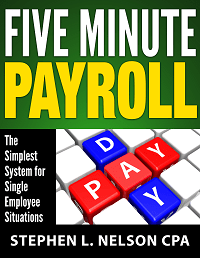
The trick to keeping your payroll processing quick and simple is to minimize the busy work involved.
In fact, I think what you do in a single-employee situation is ignore the busy work as you move through the quarter, and then after the quarter end, and only then, you send in payroll forms to the appropriate government agency (like the Internal Revenue Service) that says, “Guys? The first $10,000 of money I paid out to myself was payroll.”
Note that if you take this route, you do need to send in a check with the payroll tax forms. If you prepare a 941 that says you’re paying your guy $10,000 a quarter, you send in a check for $1,530 for example. And if you’re saying you pay your guy $16,000 a quarter, you send in a check for $2,248.
Note: If you’re interested in more information our $20 ebook, “Five Minute Payroll,” scroll to the end of this post. Also note that there’s a longer discussion of how the system works here: Quick and Dirty Payroll.
However, while the “Five Minute Payroll” system keeps your federal payroll tax returns simple, you may still have state payroll forms to deal with. Or you will if you’re not careful.
Accordingly, in this longish blog post, I summarize how you can elect to opt out of paying state payroll taxes for unemployment insurance and workers compensation insurance in a handful of states.
Note: If you have questions about a state you don’t see listed below, you may want to refer to the National Federation of Independent Business’s website that summarizes the rules by state for workers compensation: http://www.nfib.com/article/workers-compensation-laws-state-by-state-comparison-57181/
And One Quick Upfront Caution
One other point: Typically, you’re opting out of one or two taxes: State unemployment taxes and workers compensation insurance.
But there’s a trade-off here.
Opting out definitely saves you from paying these taxes.
But opting out often also means you will not get unemployment benefits if you decide to “lay yourself off.” It also means that if you got hurt in your business, then you would not be able to get workers compensation benefits.
I think this trade off is worth it in most single-employee situations.
In other words, saving both the state payroll taxes (which is nice) and then also making your payroll processing so simple that your payroll work takes five minutes a year (which is nice) more than compensate for the loss of potential unemployment benefits or workers compensation benefits. But do make this determination for yourself.
And let me make one other tangential remark about this subject. States that make corporations pay unemployment insurance on their officers usually (always?) make it difficult for those officers to obtain unemployment benefits. California, for example, makes unemployed corporate officers jump through hoops to get benefits. Michigan, as another example, limits unemployment benefits available to corporate officers and their families. New Jersey says you can’t be unemployed from a corporation if you owe five percent or more of a corporation—even if you in fact have been laid off.
And now on to the states that allow you to elect out of state unemployment taxes for single employee situations.
Alaska
While Alaska requires small businesses with even a single employee to provide workers compensation insurance (except in special cases where an employer is an approved self-insurer), Alaska allows small business corporations to exclude corporate officers from unemployment insurance. Refer to this PDF for more information: http://labor.alaska.gov/estax/forms/taxbook.pdf.
California
California requires small business corporations to provide worker compensation insurance, to cover their corporate officers with unemployment insurance, and to pay the employment training tax. However, California will allow such corporations to exclude a person who is a corporate officer and the sole shareholder from state disability insurance, including paid family leave. You use this form: http://www.edd.ca.gov/pdf_pub_ctr/de459.pdf
Colorado
Colorado small corporations do need to pay unemployment insurance premiums for corporate officers, but may reject workers compensation coverage for them by preparing and then filing this form: https://www.colorado.gov/pacific/sites/default/files/WC043_Rejection_of_Coverage_Corporate.pdf
Hawaii
Small family-owned corporations can elect to exclude family members from unemployment insurance, though not workers compensation insurance, if the family owns at least 50 percent of the corporation. You use this form to make this election: http://labor.hawaii.gov/ui/files/2012/12/UI-UC-336_3-14-07.pdf
Idaho
Idaho corporations are required to provide workers compensation insurance, but can make an election to exempt specific corporate officers from unemployment insurance by using this form: http://labor.idaho.gov/publications/corporateofficer-private.doc
Minnesota
Corporate officers who own more than 25 percent of a corporation are not subject to Minnesota unemployment insurance. Wages paid to LLC members who own more than 25 percent of an LLC are similarly not subject to unemployment insurance. Click here for more details: http://www.uimn.org/uimn/employers/wages-taxes/owner-officer/. Note that Minnesota small business corporations are required to provide workers compensation insurance to all employees, however.
Nebraska
Nebraska doesn’t allow small business corporations to exclude corporate officers (like the owner or owners) from unemployment insurance. However, corporate officers who own 25 percent of the corporation are not covered by workers compensation insurance unless they elect to be covered by filing a written election with the worker’s compensation insurer and their corporate secretary.
North Dakota
North Dakota treats corporate officers (and also often LLC managers) as employees subject to unemployment insurance and workers compensation insurance. However, a corporation or LLC may elect to exclude corporate officers and LLC managers from unemployment insurance coverage by filing this application at the beginning of the year: http://www.jobsnd.com/sites/default/files/Application%20to%20Exempt%20Corporate%20Officers%20from%20Unemployment%20Insurance%20Coverage_1.pdf
Oklahoma
Oklahoma makes small business corporations (such as those with a single shareholder-employee) pay unemployment insurance, but exempts shareholder-employees from workers compensation coverage if the person owns at least ten percent of the stock.
Oregon
Closely-held family corporations may apply to exclude corporate officers from Oregon unemployment insurance if the corporate officers are directors, shareholders or family members with they have “substantial ownership” of shares in the corporation. Substantial ownership requires the extended family own at least 75 percent of the stock. See this link for more details: http://www.oregon.gov/EMPLOY/Documents/uipub208.pdf and note that the form you use to apply is: http://www.oregon.gov/EMPLOY/Documents/form2578.pdf
Pennsylvania
Pennsylvania requires small business corporations to pay unemployment insurance, but does allow small business corporations to exclude officer-shareholders from workers compensation insurance. To obtain exclusion, the corporation files forms LIBC-509 and LIBC-513 with either the insurance company providing the workers compensation insurance or with the Compliance Section, Bureau of Workers Compensation.
South Carolina
Starting in 2015, corporate officers who “actively” provide services are exempt from unemployment insurance unless the employing corporation elects to cover them. For more information, you can refer here: http://dew.sc.gov/corpofficers/Corporate_Officers_Exemption_FAQ.pdf
Washington
Corporate officers are automatically exempt from unemployment insurance in Washington State since December 29, 2013. You can get more information here: https://esd.wa.gov/employer-taxes/corporate-officers-FAQ.
Wisconsin
Wisconsin small businesses with fewer than three employees are exempted are generally exempt from providing workers compensation insurance (EDIT: see here for more detail: http://dwd.wisconsin.gov/dwd/publications/wc/WKC_13328_P.pdf). Further, a Wisconsin corporate may elect to exclude corporate officers from Wisconsin unemployment insurance coverage starting in 2015 if the corporation’s total payroll subject to unemployment insurance is $500,000 or less, if the election covers all principal officers who own 2 percent or more of the corporation. For more information, you can read this PDF: http://dwd.wisconsin.gov/dwd/forms/ui/pdf/uct_8055_e.pdf
Wyoming
By default, Wyoming corporation officers aren’t subject to unemployment insurance taxes nor to workers compensation taxes. A corporation may, however, elect to provide coverage. Refer to the http://wyomingworkforce.org/employers-and-businesses/Pages/default.aspx for more information about either election.
And a final caution: State unemployment insurance and workers compensation laws change regularly. Use the preceding paragraphs as a place simply to start your research. You will want to follow that with a quick call to your state’s unemployment insurance office and then to your state’s workers compensation insurance office will give you up-to-date information.
Five Minute Payroll System: Save Money and Time with this $20 ebook

Small business payroll amounts to a continuous low-grade headache for one-employee businesses. The payroll laws assume not only that your business employs a healthy number of employees, but that you’ve got a payroll department all too happy to prepare and file another form or two each quarter.
Accordingly, you want to look for every opportunity simplify and economize.
One good option is to outsource your payroll to a payroll service like ADP, Paychex, or Zen Payroll. But even the most economical of these (probably Zen Payroll, which costs about $30 a month or roughly $400 a year at the time I’m writing this) adds up. Especially when you consider that these fees are not a one-time outlay, but will go on as long as you run your own corporation.
Accordingly, we’ve created an alternative, simple approach as discussed in some detail at our Quick and Dirty Payroll blog post and as documented in detail in our $20 ebook, “Five Minute Payroll.” Basically, our suggestion is that you don’t worry about weekly or monthly payroll, but instead get to the end of the quarter and then file forms with the IRS and other relevant state agencies that say the first $10,000 or $16,000 of money you’ve paid to the shareholder-employee represents wages.
This approach lets you comply with the laws—and means that you shouldn’t spend any more than a few minutes a quarter filing the 941 form and (if required) the equivalent state forms. If you’re interested in buying this $20 ebook, you can this button:
Money Back Guarantee
As with all of our digital products, the “Five Minute Payroll” ebook comes with a money back guarantee. If you don’t think what we deliver for $20 is worth it, just let us know and we’ll refund your purchase price.
Thanks so much for breaking this topic down into a few different steps. Great post!